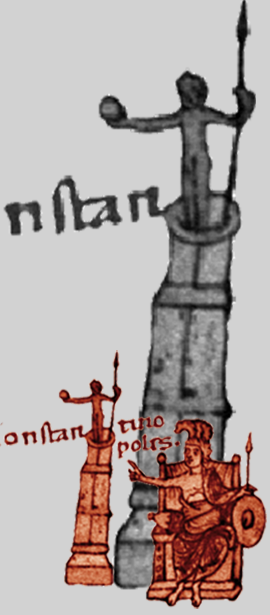Language, Text and Script
The research concentration “Language, Text, and Script” focuses on the study of the Byzantine Greek language and its development as well as on critical editions of Byzantine texts in conjunction with manuscript studies.
In addition to analysing the Byzantine vocabulary in the Lexikon zur byzantinischen Gräzität, new methods inspired by historical sociolinguistics are applied to the interpretation of Byzantine texts. As regards literary genres, projects about Byzantine poetry from 1081 until 1204 and Byzantine epigrams (with an edition of a corpus of all epigrams on art objects) are parts of this research focus.
The edition projects are divided into documentary texts (i. e. products of the imperial and patriarchal chanceries, including the documents of the Register of the Patriarchate of Constantinople [PRK]) and the literary texts of Nicephorus Callistu Xanthopulus (Ecclesiastical History), of Philippus Monotropus (Dioptra), of the Chronicon Paschale, and the Metrical Paraphrasis of the Psalms by Manuel Philes . Here too, the editors adopt new methods with regard to audience relevance by taking into account the text division in cola through Byzantine punctuation (stixis) as attested by the manuscripts.
A further focus promotes the tradition of the Viennese School in the study of palaeography through research on Greek scribes and on Byzantine writing and reading culture, especially on the basis of the Greek manuscripts in the Austrian National Library. In continuation and addition to the establishment of basic corpora on Greek scribes (Repertorium der griechischen Kopisten), the development of prosopographic palaeography as a new research approach highlights the socio-cultural aspects of script and book in Byzantine society, along with the issues of literary education and reading culture in Byzantium (e. g. in the transmission of the works of Demosthenes). In continuation of a path-breaking EU project (Rinascimento Virtuale), the Viennese research on Greek palimpsest has assumed a leading role in this regard; two projects (including the newly discovered Scythica Vindobonensia of Dexippus) deal with the study and analysis of the Greek palimpsests of the Austrian National Library with the help of new technologies, and aim to make these results accessible through editions of hitherto unknown texts (or text variants) and special studies.

